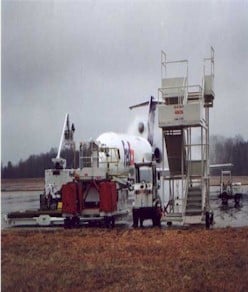Federal Express and the Piedmont Triad International Airport plan to build a FedEx hub that would serve the entire U.S. east coast by 2005, with up to 126 flights per night.The project entails a third airport runway that FedEx planes would use mostly between the hours of midnight and six a.m. The PTI Airport Authority is in charge of the process, though the Federal Aviation Administration will recommend giving or withholding federal funds.
Opposition to the project began to grow not long after FedEx announced in April 1998 that it chose the Piedmont airport as the hub location. Concerns about the new hub include increased air pollution, water pollution, depletion of water supply, wetland destruction, public safety, and health and noise pollution. Many citizens also question the tax incentive package Governor Jim Hunt approved in July 1998, that may give FedEx up to $115 million in tax credits and exemptions.
Greensboro residents Ken Urbine and Richard Michaud lost a court battle in March 2000 to prevent the Airport Authority from condemning their property, which the airport bought in order to further expansion.
The Greensboro Chamber of Commerce unanimously backs the proposed hub, and is one of the major forces behind its promotion. In an open letter to its membership, the Chamber claimed that “FedEx will bring an incredible 16,000 new jobs to the region.”
That number includes not only the 1,500 FedEx positions directly related to the hub, but also jobs created when businesses attracted by the new cargo hub locate in the Triad. In 1998, University of North Carolina economist Don Jud conducted a study regarding the economic impact of the hub, also estimating that 16,000 jobs would be created.
The new hub would bring an economic boost to the Triad; however, estimates as to the magnitude vary. Don Jud argued that $2.4 billion would result. In its membership letter the Chamber of Commerce stated, “the overall investment will have a $7.5 billion impact.”
The Chamber also declared regional tax base expansion and the enhancement of the city’s reputation as benefits of the FedEx hub. Greensboro College President Craven Williams is the chairman of the Greensboro Chamber of Commerce. He specifically referred to the economic decline predicted by the McKinsey report, a comprehensive study, funded by local foundations, of the area’s economics. He stated that the hub would attract more advanced manufacturing businesses that would provide the kinds of well-paying jobs that the area needs in order to recover.
Much of the speculation as to an economic boost rests upon other businesses being attracted by the hub. MWG-Biotech Inc. and Medi Manufacturing both say that the FedEx hub played a role in their decisions to locate in the Triad.
A former Airport Authority chairman also backs the hub, suggesting that Greensboro should use its comparative advantage: an airport without many weather-related closures and a location on Interstates 85 and 40 as well as the Norfolk Southern Railway. The chairman also noted that aircraft are getting progressively quieter.
Opposition group Piedmont Quality of Life Coalition, led by President Chris Peeler, is voicing concern as to the costs of the hub. On February 5, Chris Peeler visited Guilford’s Introduction to Environmental Studies class. She explained that a large focus of the group is about the health risks posed by increased airport activity. She brought to the class several reports of increased respiratory illness and cancer risk in areas near airports, including Chicago’s O’Hare and airports that serve Minneapolis and St. Paul, Minn., and Boston.
“In the Logan [Boston] airport, asthma and allergies were twice as common in the most affected [nearest the airport] areas as compared to the least affected areas.” She noted that the toxic emissions from aircraft aren’t regulated by the government, as automobile emissions are.
The Piedmont Quality of Life Coalition is also troubled with safety. According to their website, www.pqlc.org, FedEx experienced at least six plane crashes in 1998 and at least one more in the past year. The coalition’s concern is that the Triad’s airport is in a densely residential area.
There are also complaints about the de-icing chemicals regularly used by planes. These chemicals are used not only in wintertime, since planes routinely travel into the cold atmosphere. The wings are coated with these toxic substances before takeoff, and the material falls back to the ground as the plane flies. Water quality all around the area could suffer with the increased exposure to de-icing chemicals, which in turn would pose a risk not only human health, but also to other species dependent upon the water.
The FedEx hub would require 300 additional acres of pavement, the size of 238 football fields. This includes 200 truck stalls, space for 70 FedEx planes, and 2,400 employee-parking spaces. The third runway requires 32 more acres. Opponents argue that this much pavement would deplete that already scarce supply of groundwater for the region.
Water quality could also suffer from the 23 acres of wetland and 1,500 feet of stream destruction necessary for the hub project, though the Airport Authority states that it can build more new wetland than it will destroy.
Don Kirkman, president and CEO of Piedmont Triad Partnership, visited the Environmental Studies class on Feb. 7. His organization deals mainly with recruiting businesses to the region. In his presentation, he explained that the air pollution caused by planes would be minimal in comparison to the pollution due to the automobiles that already affect the Triad.
He also brought up a hypothesis to explain the cause for the environmental concerns that are being voiced by the opposition. He said that the residents living close to the airport who are very upset about the potential noise are grasping at any problem that might conceivably arise from the FedEx project.

